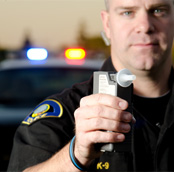Traffic Ticket Information : Major & Minor Violations
Traffic violations are divided into major violations and minor violations. The most minor type is a parking violation, which is not counted against a driving record, though a person may be arrested for unpaid violations. Increasing in severity are speeding and other moving violations, which usually do not require a court appearance. More serious moving violations are reckless driving and leaving the scene of an accident. The most severe violation is drunk driving, also called DUI or DWI.
All but the most serious traffic violations generally are prosecuted as misdemeanors; however, repeat offenders may be prosecuted at the level of felonies. As misdemeanor charges, most traffic violations require payment of a fine but no jail time. State laws do not allow a judge to impose a jail sentence for speeding or failure to stop at a signal. However, more serious traffic violations, such as drunk or reckless driving, may result in jail time at the judge’s discretion.
Connect with Top-rated Attorneys Near You
Sponsored Advertisement
Latest Article
The Exclusionary Rule: Definition, Examples, and Impact
What Is the Exclusionary Rule? What Are Common Situations Where It Applies? Are There Exceptions? How Has It Changed Cri... Read More
False Imprisonment: Protecting Yourself Against Wrongful Detention
What Is False Imprisonment? What Are the Potential Remedies? Are There Exceptions to the Rule? As humans, one of our mo... Read More
Lying Under Oath: The True Penalty for Perjury
What Is Perjury? What Must the Prosecutor Prove? What Are the Penalties? In the legal system, oral and written testimon... Read More
GETLEGAL®ATTORNEY DIRECTORY
Find Leading Attorneys in Your Area
NEED PROFESSIONAL HELP?
Talk to an Attorney
How It Works
- Briefly tell us about your case
- Provide your contact information
- Choose attorneys to contact you





